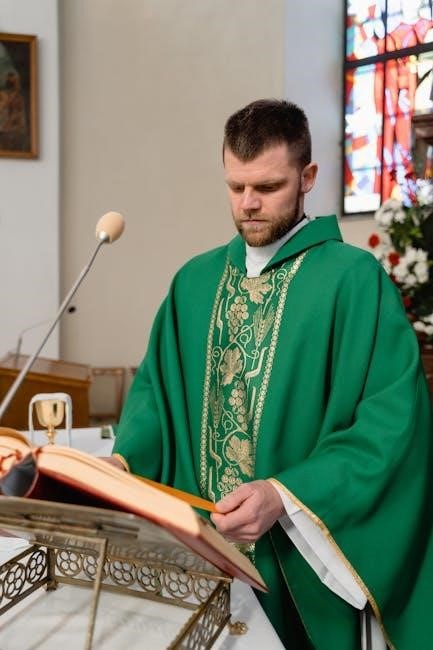
Wayne Grudem’s Systematic Theology is a comprehensive guide to biblical doctrine, offering clear explanations of Christian theology for students and pastors. Its structured approach and accessible language make it a valuable resource for understanding complex theological concepts.

1.1 Overview of the Book and Its Significance
Wayne Grudem’s Systematic Theology is a seminal work in evangelical theology, providing a comprehensive exploration of Christian doctrine. First published in 1994, the book is structured to guide readers through the entirety of biblical teaching, from the doctrine of God to the church and the future. Its significance lies in its accessibility, blending deep theological insight with clear, engaging language. Grudem’s approach emphasizes the authority of Scripture, making it a foundational resource for pastors, students, and laypeople seeking to understand Christian theology. The book’s systematic structure and biblical focus have made it a cornerstone of modern evangelical education and discourse.
1.2 Key Features and Structure of the Book
Wayne Grudem’s Systematic Theology is structured into 57 chapters, divided into seven major sections: the Word of God, God, humanity, sin, salvation, the church, and the future. Each section builds logically, providing a thorough exploration of biblical doctrine. Key features include clear headings, scriptural references, and practical applications. The book emphasizes the authority of Scripture, making it accessible for both academic and pastoral use. Its comprehensive approach ensures readers gain a holistic understanding of Christian theology, while its structured format facilitates easy navigation and study.

Major Doctrines in Wayne Grudem’s Systematic Theology
Grudem’s theology explores foundational Christian doctrines, including the nature of God, humanity, sin, and salvation, providing a clear, biblical framework for understanding these essential topics.
2.1 The Doctrine of God: Attributes and Trinity
In his Systematic Theology, Wayne Grudem thoroughly examines the doctrine of God, emphasizing His divine attributes such as omnipotence, omniscience, and benevolence. He also delves into the mystery of the Trinity, explaining the distinct yet unified roles of the Father, Son, and Holy Spirit. Grudem’s approach is deeply rooted in Scripture, providing a clear and accessible understanding of these complex theological concepts. His discussion on God’s sovereignty and love, particularly in relation to human freedom, offers valuable insights for both scholars and lay readers seeking a deeper grasp of Christian theology.
2.2 The Doctrine of Humanity and Sin
Wayne Grudem’s Systematic Theology explores the doctrine of humanity and sin, defining sin as any failure to conform to God’s moral law. He emphasizes humanity’s creation in God’s image, highlighting qualities like rationality and morality. Grudem also addresses the nature of sin, including original sin and its effects on humanity. He discusses total depravity, stressing that sin affects every aspect of human nature, yet maintains human responsibility. This section provides a biblical framework for understanding humanity’s fallen state and the necessity of redemption, offering insights into the theological implications of sin.
2.3 The Doctrine of Salvation: Definition and Process
Wayne Grudem defines salvation as God’s deliverance from sin’s penalty through Christ’s death and resurrection. He outlines the process as justification (legal declaration of righteousness), sanctification (progressive holiness), and glorification (final perfection in heaven). Grudem emphasizes faith as the means of receiving salvation, highlighting the biblical basis for these doctrines. His systematic approach clarifies the theological framework, ensuring a comprehensive understanding of salvation’s nature and application. This section provides a clear, biblically grounded explanation of how God saves humanity, addressing both the divine initiative and human response in redemption.
Practical Applications of Grudem’s Theology
Grudem’s theology applies to everyday Christian living, offering guidance on issues like leadership roles, marriage, and church governance, while emphasizing biblical principles for modern challenges.
3.1 Grudem’s Views on Women in Church Leadership
Wayne Grudem advocates a complementarian view, opposing women serving as elders or pastors. He interprets 1 Timothy 2:11-12 and 1 Corinthians 14:33-34 as prohibiting women from teaching or having authority over men in the church. However, he supports women in other leadership roles, such as teaching ministries or serving as deacons, where authority is not exercised over men. Grudem’s position has sparked significant debate but remains influential in evangelical circles, shaping discussions on gender roles in church leadership and governance.
3.2 Grudem’s Position on Divorce and Marriage
Wayne Grudem holds a conservative view on marriage and divorce, emphasizing the permanence of marriage as a divine institution. He affirms that marriage is a lifelong commitment between one man and one woman. Grudem initially opposed divorce except in cases of adultery or desertion, based on Matthew 5:31-32 and 1 Corinthians 7. However, he later revised his stance, acknowledging abuse as grounds for divorce, aligning with the biblical principle of protecting the vulnerable. Grudem’s theology balances the sanctity of marriage with compassion for victims of abuse, reflecting a nuanced approach to complex marital issues.

Historical and Cultural Context
Wayne Grudem’s Systematic Theology emerges from the evangelical tradition, reflecting historical theological developments while addressing contemporary cultural and doctrinal issues with a biblically grounded perspective.
4.1 The Development of Systematic Theology as a Discipline
Systematic theology emerged as a formal discipline in the early church, organizing Christian doctrine into a coherent framework. It evolved through the Middle Ages, with scholastic theologians like Thomas Aquinas integrating philosophy and Scripture. The Reformation brought a renewed focus on biblical authority, reshaping systematic theology. By the 19th century, it became a distinct academic field, emphasizing historical and cultural contexts. Today, systematic theology bridges biblical studies, historical theology, and practical application, providing a holistic understanding of Christian doctrine. Wayne Grudem’s work reflects this tradition, offering a contemporary, biblically grounded perspective.
4.2 Grudem’s Contribution to Evangelical Theology
Wayne Grudem’s Systematic Theology has significantly shaped evangelical theology, offering a biblically grounded, accessible synthesis of doctrine. His work emphasizes the authority of Scripture and applies theological truths to contemporary issues. Grudem’s clarity and thoroughness have made his theology a trusted resource for both scholars and laypeople. His contributions include advocating for complementarian views on gender roles and reexamining traditional perspectives on divorce. By addressing practical and theological questions, Grudem has bridged the gap between academia and the church, influencing a generation of evangelical thinkers and leaders.

Resources and Companion Materials
Wayne Grudem’s Systematic Theology is complemented by various resources, including a companion book by Gregg Allison and study guides, which enhance understanding and application of the theological concepts presented.
5.1 Companion to Wayne Grudem’s Systematic Theology by Gregg Allison
Companion to Wayne Grudem’s Systematic Theology by Gregg Allison is a supplementary resource designed to deepen understanding of Grudem’s work. Published in 2011 by Zondervan, this book provides a detailed analysis and application of Grudem’s theological framework. It includes summaries of key doctrines, theological insights, and practical implications. Allison’s work serves as a study aid, helping readers engage more effectively with Grudem’s Systematic Theology. The companion book is particularly useful for students and pastors seeking to apply biblical doctrine in ministry contexts. It bridges the gap between theoretical theology and practical application, enriching the reader’s theological journey.

5.2 Study Guides and Supplementary Materials
Various study guides and supplementary materials complement Wayne Grudem’s Systematic Theology, enhancing its accessibility and application. These resources include detailed study guides that breakdown complex doctrines into manageable sections, ideal for individual or group study. Additionally, a laminated sheet summarizing key theological concepts is available, providing quick reference for students and pastors. These materials are designed to facilitate a deeper engagement with Grudem’s work, ensuring a comprehensive understanding of biblical doctrine. They are particularly beneficial for those seeking to apply theological truths in practical ministry and everyday life, making Grudem’s teachings more approachable and actionable for a broader audience.
Wayne Grudem’s Systematic Theology remains a cornerstone of evangelical theological education, influencing countless scholars and pastors. Its clear, biblically grounded approach has shaped modern theological discourse, bridging academia and ministry effectively.

6.1 The Influence of Systematic Theology on Modern Theology

Wayne Grudem’s Systematic Theology has profoundly shaped modern theological thought, serving as a foundational text for evangelical scholars and pastors. Its clear, biblically rooted explanations have made complex doctrines accessible to a broad audience, fostering deeper theological understanding.
The book’s structured approach has influenced theological education, equipping leaders with a comprehensive framework for addressing contemporary issues. Grudem’s work bridges academia and ministry, ensuring that systematic theology remains relevant and applicable in today’s diverse theological landscape.
6.2 Critiques and Responses to Grudem’s Theology
Wayne Grudem’s theology has faced critiques, particularly regarding his views on women in church leadership and divorce. Some scholars argue his interpretation of biblical texts on these topics is overly restrictive. Additionally, his stance on miraculous gifts has sparked debates within evangelical circles. Despite this, Grudem’s systematic approach remains widely respected for its clarity and biblical grounding. His work continues to be a key reference in theological discussions, demonstrating the enduring relevance of systematic theology in addressing contemporary theological issues and challenges.
